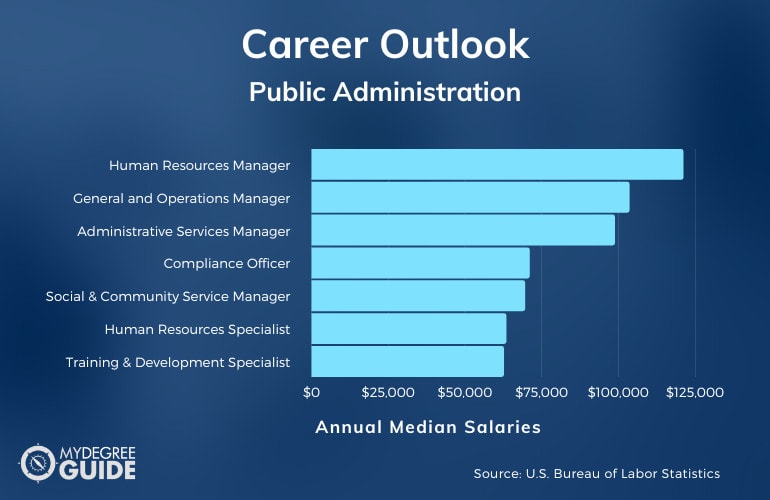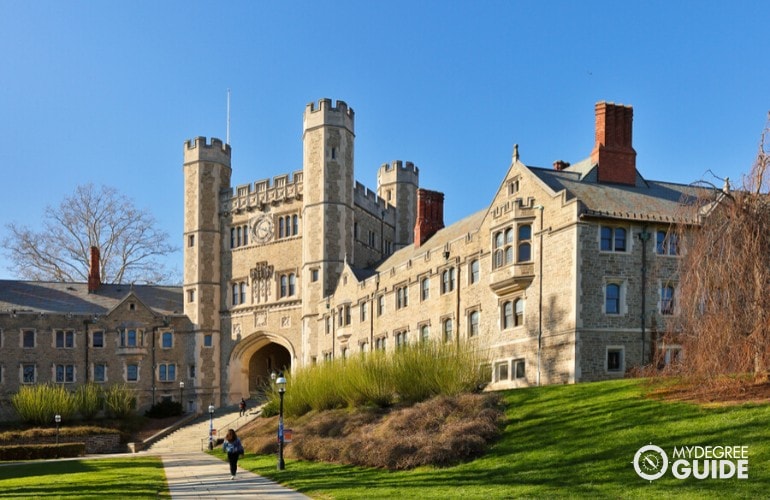Earning a degree in Online Public Administration Degree shows your commitment to improving the communities in which you live and work.

Editorial Listing ShortCode:
This program can help you learn to put public policies into practice and carry out tasks that keep government organizations running. This degree can also help you qualify for government, nonprofit or healthcare jobs.
Universities Offering Public Administration Online Bachelor’s Degree Program
Methodology: The following school list is in alphabetical order. To be included, a college or university must be regionally accredited and offer degree programs online or in a hybrid format.
1. Barry University
Barry University is a private Catholic postsecondary school that is situated in Miami, Florida. Opening in 1949 as a women’s college, Barry University now serves both men and women in a variety of education options that lead to undergraduate and graduate degrees. Popular programs at BU include liberal arts, medical technology, and social work.
- Bachelor of Public Administration
Barry University is accredited by the Southern Association of Colleges and Schools Commission on Colleges.
2. California Baptist University
California Baptist University opened its door to provide the community with a private higher education option in 1950. Serving students with a faith-based curriculum that leads to undergraduate and graduate degrees in a multitude of academic fields, CDU has both online and in-class programs to assist with student achievement.
- BA in Public Administration
California Baptist University is accredited by the Western Association of Schools and Colleges Senior College and University Commission.
3. Central Michigan University
Established in 1892, Central Michigan University is a world-renowned postsecondary school that serves thousands of students throughout the world every year. This public university is known for its high-quality undergraduate and graduate degrees in over two hundred academic fields.
Blending technology and research in each curriculum, CMU works to help every student find their academic path.
- BS in Public and Nonprofit Administration
Central Michigan University is regionally accredited by the Higher Learning Commission of the North Central Association of Colleges and Schools.
4. Franklin University
Opening its doors in 1902, Franklin University has expanded into a large private educational entity that serves students worldwide through online and campus-based curriculums.
Students seeking an undergraduate, graduate, or doctoral degree through Franklin University has a range of academic areas to choose from, including business, administration, and healthcare.
- BS in Public Administration
Franklin University is accredited by the Higher Learning Commission.
5. National University
Opening in 1971, National University provides students worldwide with high-quality educational programs that allow students to obtain an undergraduate, graduate, or doctoral degree. Online degree options allow students to complete degrees in less time, but traditional on-campus degree programs are also available at NU.
- Bachelor of Public Administration
National University is accredited by the Western Association of Schools and Colleges.
6. Northern Arizona University
Northern Arizona University began its long history of providing public education options in 1899. NAU offers students over 150 academic programs that lead to undergraduate, graduate, or doctoral degrees.
Known for their extensive research opportunities, NAU help propel is students into their field by linking students with other professions, and experts in their study area.
- BIS in Public Administration
NAU is accredited by the Higher Learning Commission.
7. Point Park University
Point Park University is a private educational facility that first launched in 1960 and has been offering students a variety of educational degrees options with a liberal arts foundation ever since. Students attending Point Park University can gain an undergraduate or graduate degree in a variety of academic areas.
- BS in Public Administration
Point Park University is accredited by the Middle States Association of Colleges & Schools Commission on Higher Education.
8. Roger Williams University
Roger Williams University began its history as a private liberal arts college in 1956. Serving more than 5,000 students annually, Roger Williams University offers various degree options that lead to undergraduate and graduate degrees. It has over fifty majors and programs for students to be able to find the educational option that works best for them.
- BS in Public Administration
Roger Williams University is accredited by the New England Commission of Higher Education.
9. University of La Verne
Founded in 1981 as a private educational facility, the University of La Verne gives students the means of obtaining an undergraduate or graduate degree in a multitude of program areas though online and in-class study options. Aside from its dynamic online curriculums, ULV has nine campus locations throughout California.
- BS in Public Administration
The University of La Verne is accredited by the Senior College Commission of the Western Association of Schools and Colleges.
10. Upper Iowa University
Opening in 1957, Upper Iowa University works to meet students’ needs by offering a variety of virtual programs, study abroad programs, and collaboration between students looking to gain an undergraduate or graduate degree. This private school has over 40 majors and minors to choose from.
- BS in Public Administration – Emergency Management
- BS in Public Administration – Fire Science
- BS in Public Administration – Law Enforcement
- BS in Public Administration – Policy/Politics
Upper Iowa University is accredited by the Higher Learning Commission.
Online Public Administration Degrees

A lifelong career in the public sector can begin with a public administration bachelors degree online. If you want to serve your community, this could be the educational path for you.
This field of study can help you learn about the laws and policies that shape government programs and community systems. Public administration programs offer classes on the political system and the organization of local, state and federal governments.
They can help you learn essential skills for leadership in office settings, such as team management and interpersonal communication. Other classes may cover finance, accounting, information technology and project management.
Public administrators are responsible for implementing public policies. This often comes in the form of program management, so you may learn how to evaluate community demands, develop programs, bring them to fruition and evaluate their effectiveness.
It’s common for public administration professionals to work in government settings. At the municipal level, you might work in urban planning, city management or county finance. Jobs related to civil service, government administration and public policy are also available with state and federal departments.
Nonprofit organizations and healthcare organizations rely on leaders with a similar skillset. Your public administration bachelor’s degree could help you get a job with a charitable organization or a medical clinic. You might work in the programming, outreach or fundraising departments, or you might even become an executive director.
You may want to advance your career with a master’s degree someday. You could consider an online Master’s in Public Administration, Master’s in Public Policy or a Master’s in Business Administration. Also, some universities offer part time MPA programs, which may allow you to pursue your graduate degree while maintaining your career and other responsibilities.
Or, you could even consider a Doctor of Public Administration online.
Public Administration Careers & Salaries

Most people who study public administration in college have plans to go into government work. This degree program can help prepare you to take jobs with municipal governments or state or federal agencies. Potential job titles include administrative assistant, operations director or program manager.
Policymaking is a top interest of many public administration graduates. You might want a position that involves analyzing current policies or crafting new ones. Such roles require a keen understanding of politics as well as public service.
Keep in mind that you won’t be limited to government jobs with a public administration degree. The lessons you learn can apply directly to many nonprofit settings as well. You might find a human resources, finance or project management job with a local community center or a national charity.
Your studies can help you gain skills that you could transfer to healthcare settings. Public health departments and community clinics are some of the most obvious choices for a person interested in public administration, but you might be able to find work as an account manager or a compliance officer in hospitals or long-term care facilities as well.
Although the curriculum for a public administration degree doesn’t focus on the private business sector, it’s possible that you’ll end up working there at some point. Your accounting, finance, communication and management skills can help you build the foundation that you’ll need.
According to the Bureau of Labor Statistics, some careers in the public administration field include:
| Careers | Annual Median Salary |
| Human Resources Manager | $121,220 |
| General and Operations Manager | $103,650 |
| Administrative Services Manager | $98,890 |
| Compliance Officer | $71,100 |
| Social and Community Service Manager | $69,600 |
| Human Resources Specialist | $63,490 |
| Training and Development Specialist | $62,700 |
| Executive Secretary or Executive Administrative Assistant | $63,110 |
| Fundraiser | $59,610 |
| Social Worker | $51,760 |
Right out of school, you may be able to get a job as an assistant or an entry-level specialist. As your experience grows, you might be able to advance to higher positions that come with bigger paychecks.
Going back to school for a master’s degree may make you an attractive candidate for top leadership roles, such as being the executive director of a community organization.
Public Administration Specializations & Concentrations

Choosing a concentration for your major can give you the opportunity to take several classes that focus on a topic of interest to you.
- Emergency Management: To help them be ready to lead communities through crisis situations, students in this concentration take courses on municipal infrastructure and disaster recovery.
- Nonprofit Management: Through classes on organizational leadership, volunteer management and fundraising, students can learn how to head up charitable and community groups.
- Public Health Policy: For a job in community health education or wellness programming, think about taking epidemiology, biostatistics and healthcare ethics in a public health policy specialization.
- Public Service: A career in government work may begin with a public service concentration and courses on urban planning, public policy, and parks and recreation.
Specializations may help prepare you for success in the workforce. For example, with an emergency management concentration, you might stand out as a top candidate for a job as a Homeland Security officer or a disaster preparedness specialist.
Choosing an Accredited Public Administration Degree

Deciding to go to school for public administration is only the first step of your college enrollment process. Next, you’ll need to decide where to submit applications.
As you explore the options at various universities, consider factors like:
- Accreditation: All students are encouraged to attend regionally accredited universities because they’re reputable and respected. You may also want to choose programs that have programmatic accreditation from the Network of Schools of Public Policy, Affairs, and Administration (NASPAA).
- Cost: Some colleges cost a good deal more per credit hour than others, but scholarships and financial aid may change your out-of-pocket price.
- Curriculum: Looking over a list of classes that a program offers can help you get a sense of what you’ll learn during your time in school. You may want to choose a program that allows you to tailor your education with a variety of elective courses.
- Format: Some students like the accountability of showing up on campus for classes, but many appreciate the flexible format of online courses. You can choose a traditional program, a fully online one or a hybrid approach that blends on-campus and digital learning.
- Specializations: If you have a specific career path in mind, you might want to enroll in a concentration track that can help equip you with specialized knowledge in that public administration discipline.
- Time commitment: A full-time course load can help you finish school faster, but if you have demanding work or family responsibilities, you may want to look for a school that allows you to enroll part-time.
It’s usually a good idea to pick out a few different schools that appeal to you. If you get into more than one program, you can reevaluate your pros and cons lists to help you make the final decision.
Public Administration Curriculum & Courses

The courses for your public administration bachelor’s degree will likely revolve around working in government and nonprofit settings. Public administrators often have responsibilities similar to those of workers in the private sector, but they need to understand how to apply business and leadership concepts in the specialized setting of nonprofit operations. Some common courses that are taken in public administration programs include:
- Accounting for Public Settings: This course covers methods for keeping track of funds that go in and out of government departments.
- American Political Systems: This course provides an overview of government systems at the federal, state and local levels and discuss how public administration interacts with politics.
- City Planning: During your time in this course, you may consider factors like social interactions, sustainability and architecture as you discuss leadership in urban areas.
- Communication for Public Sector Employees: This class can help you learn to clearly communicate with fellow employees and the public through written and oral channels.
- Grant Writing: This class can help prepare you to secure funds through strong grant applications.
- Introduction to Public Administration: This foundational course is designed to introduce students to the major themes of public administration studies.
- Leading Public Organizations: A leadership class may cover team management, organizational structure and human resources.
- Managing Government Finances: This course can help you learn how to work within a budget and use financial data for decision-making.
- Program Management: These studies can help you learn how to develop, run and evaluate programs in your community.
- Public Policy: This course provides opportunities to discuss how policies are developed and learn about the role that policies may play in your administrative work.
You’ll likely take these major-specific courses in addition to a general education core.
Accreditation

Regional accreditation is considered the mark of a reputable college. This recognition is bestowed only on institutions that have a proven track record of educating students thoroughly and providing well-run learning environments.
Classes and degrees from regionally accredited colleges are respected. Another college may let you transfer in regionally accredited coursework. Employers may be more likely to hire you if you have an accredited degree.
The Council for Higher Education Accreditation (CHEA) recognizes seven U.S. organizations that have the right to confer regional accreditation. They include the Higher Learning Commission (HLC) and the New England Commission of Higher Education (NECHE).
For a public administration degree, you may want to choose a school that’s accredited by the Network of Schools of Public Policy, Affairs, and Administration (NASPAA) as well. This programmatic accreditor recognizes programs that do an excellent job of preparing students to enter the fields of public administration and public service.
NASPAA accreditation is a sign that you’ll receive an education that meets industry standards and is relevant to the needs of modern government and nonprofit agencies.
Public Administration Professional Organizations

Whether you work in government service on nonprofit management, you want your efforts to make a difference. Becoming a member of an industry association can provide you opportunities to receive access to a wealth of resources that can help boost your career, your personal development, and your connection to like-minded professionals.
- Alliance for Nonprofit Management: If your work contributes to community betterment or social improvement, then you’ll probably appreciate the networking, discounts and resources that are available through membership in the Alliance.
- American Society for Public Administration: Whether you’re an elected official or a hired employee, you’re invited to enhance your public service career by participating in the conferences, local chapters and online platforms that ASPA offers.
- Association for Public Policy Analysis and Management: APPAM promotes research and education in the field of public policy, and joining will give you access to job boards, a journal subscription and a library of digital resources.
- International Public Policy Association: By becoming a member of IPPA, you can support scientific research related to public policy, and you can also stay in touch with industry developments through newsletters, conferences and online resources.
- National Academy of Public Administration: To become a Fellow in this Congressionally chartered organization, you must be nominated and approved, and you must commit to contributing to the Academy’s work of advising government leaders.
Group membership usually involves annual or lifetime dues. To encourage your participation, some organizations offer student rates. In addition to granting you membership privileges, your contribution may also help to further the research and advocacy work in which your group participates.
Financial Aid & Scholarships

Going to college requires an investment of time and money, but the education and experience that you can gain in the process may make it worthwhile. Even still, before enrolling in a program, you should carefully consider how you’re going to pay for it. Fortunately, there are a variety of programs that can help.
Applying for government aid should be one of your first steps. This is done through the Free Application for Federal Student Aid (FAFSA). After submitting this form, you’ll learn whether you are eligible for grant or loan programs from the federal government.
Grants are funds that you don’t have to repay after graduation. Loans are money that you borrow to pay for school costs. You’ll have to repay the money with interest, but government loans usually have lower interest rates than private ones.
Your FAFSA results may qualify you for funding from state grant or loan programs as well. Scholarships are another way to cover a portion of your schooling. These free gifts of money may come from community organizations, national foundations or your college. To earn scholarships, you usually have to submit applications and be selected as a winner.
What Can I Do With a BA in Public Administration?

A degree in public administration is often the first step to a job with a government agency. You might work in city management or urban planning. Having this degree might also prepare you for an elected position, such as serving as mayor.
State and federal governments also have roles for public administration graduates. You might be a program analyst with your state health department or be a disaster management specialist for a federal agency.
How Long Does It Take to Get a Public Administration Degree?
A bachelor’s degree usually requires earning 120 college credit hours. Traditionally, this takes four years of full-time study. If you choose the best online college for you, you may be able to enroll in an accelerated program to cut down on the overall length. With this format, you’ll take one class right after another.
Have you taken any college courses in the past? If so, you may be able to shorten your school time by transferring in credits.
What Can You Do With a Bachelor’s in Public Administration Degree?

Many students choose a public administration bachelor’s degree so they can go into government work, also known as civil service. Jobs may be available with city, county, state or federal agencies.
Public administration degrees are also good training for jobs with nonprofit organizations or health clinics. You could work as a grant writer, a health educator or a program manager. With experience, you might become the executive director of a community-based organization.
Are There Any Affordable Bachelors in Public Administration Degrees?
There are many ways to make college fit your budget. First, look into public universities in your state. Residents often receive the lowest tuition rates. Some state colleges even offer online programs.
You can also apply for state or federal financial aid. Grants are free gifts of money that don’t require repayment. Low-interest loans allow you to defer your payments until after graduation. Scholarships from your university or other sources can further reduce your expenses.
How Long Does It Take to Get a Bachelor’s in Public Administration Online?

Going to college online may help you get your degree in just a few years. Many online schools use an accelerated calendar. Classes last six to eight weeks each, and they run back to back throughout the year.
If you choose a traditional school calendar, it may take you about eight semesters of full-time classes to complete your curriculum. That approach will take longer, but it might allow you a summer break from schoolwork.
How Much Does an Online Bachelors in Public Administration Cost?
Online bachelor’s degrees often cost $300 to $600 per credit hour. Unless you already have previous coursework to transfer in, you will probably need to earn 120 credits to complete your degree. To calculate your overall cost, factor in technology fees, textbooks and other expenses as well.
Financial aid and scholarships can reduce your college bill. To learn about your options, fill out the FAFSA and talk to your school’s financial aid department.
Will My Online Degree Be Respected?

Yes, you can earn a respectable degree through online study. Digital classes typically cover the same material as their on-campus counterparts and require comparable assignments. Plus, your diploma probably won’t specify that you earned your degree online.
Just be sure to choose a college with regional accreditation, which is the mark of a reputable school. It’s also a good idea for public administration programs to have accreditation from the Network of Schools of Public Policy, Affairs, and Administration (NSPPAA).
Is a Degree in Public Administration Worth It?
Yes, there is a significant need for people with a public administration background. According to the U.S. Bureau of Labor Statistics, positions for social and community service managers have a projected growth rate of 17% for the next ten years.
Plus, a career in public administration comes with the satisfaction of knowing that you’re making a difference for residents of your city or people throughout the nation.
Getting Your Bachelor’s in Public Administration Degree Online

Your community needs your service. For a career that can help you benefit your local area, your state or your country, consider an online bachelor’s degree in public administration.
This degree can help you become ready to work for a government agency, a nonprofit organization or a healthcare institution. You might hold a job in the marketing, human resources or programming departments. Someday, you might become an agency director.
You can get started with a career in this growing field through flexible online studies. Now is the time to submit applications to public administration programs and prepare for a new chapter in your life.
